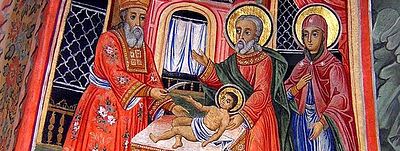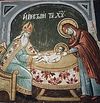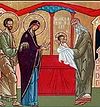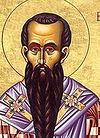

| Previous day | Next day |
| Old Style
January 1
|
Saturday |
New Style
January 14
|
| Saturday before the Theophany. Tone 5. | No fast.
|
![]() The Circumcision of Our Lord Jesus Christ
The Circumcision of Our Lord Jesus Christ
![]() St. Basil the Great, archbishop of Caesarea in Cappadocia (379).
St. Basil the Great, archbishop of Caesarea in Cappadocia (379).
Martyr Basil of Ancyra (ca. 362) St. Emilia, mother of Sts. Macrina, Basil the Great, Naucratius, Peter of Sebaste, and Gregory of Nyssa (4th c.). St. Athanasius, wonderworker of Poltava, bishop of Mogilev and Polotsk (1801).
New Monk-martyr Jeremiah (Leonov) of Valaam (1918). New Hieromartyrs Platon (Kulbush), bishop of Revel, Estonia, and archpriests Michael Bleive and Nicholas Bezhanitsky (1919), and Alexander (Trapitsyn), archbishop of Samara (1938).
St. Eugendus, abbot of Condat in the Jura Mountains (510). St. Fanchea of Killeany (Ireland) (ca. 520). St. Fulgentius, bishop of Ruspe in North Africa (533). St. Theodosius of Tryglia, abbot. St. Clarus, abbot of St. Marcellus Monastery in Vienne (Gaul) (ca. 660). New Martyr Peter of Tripolis in the Peloponnese, at Temisi in Asia Minor (1776).
Repose of Sergius A. Nilus, spiritual writer (1929), Nun Faina of Starobelsk (1972), and Archimandrite Mitrophan (Manuiloff) (1986).
Thoughts for Each Day of the Year
According to the Daily Church Readings from the Word of God
By St. Theophan the Recluse

New Year’s Day. The Circumcision of the Lord. Saint Basil the Great. [Col. 2:8–12; Luke 2:20–21, 40–52].
Since New Year’s Day is the beginning of the days of the year, we ought to gather in our soul those thoughts, feelings and dispositions that would direct our affairs throughout the year in a Christian way. We will find this the moment we bring to mind what New Year’s Day is in the spiritual life. In the spiritual life, New Year’s Day is when one who has been living carelessly becomes zealous about salvation and pleasing God. When one makes this resolution, then all is rebuilt afresh both internally and externally, upon new beginnings—the old passes away and all is new. If you have this, renew it; if not, acquire it—and for you this will be New Year’s Day.
A worthy celebration of the feast of the Circumcision of the Lord and of the commemoration of Saint Basil the Great are also tied with this. The essence of this change we have mentioned is that a person begins from this moment on to live solely for God, for his salvation; whereas previously he lived exclusively for himself, preparing destruction for himself. Now he abandons former habits, all comforts and all in which he found pleasure; he cuts off passions and lustful dispositions and takes on works of strict self-denial. Such a change precisely represents what, according to the Apostle, the circumcision of the heart should be. The celebration of the circumcision of the Lord reminds us of this and obligates us to do it, while St. Basil the Great provides us with an example to follow. So all the themes which crowd our consciousness on New Year’s Day come together into one—our inner renewal through the circumcision of the heart. If it pleases the Lord to give someone this mindset on New Year’s Day—that is, not only to think in such a way, but also to bring all of this into his life—he will celebrate New Year’s Day in a most perfect Christian manner, and will prepare for a Christian passing of the whole year. On the following New Year’s Day he will only have to renew and enliven what he has now taken on.
Saturday before Theophany. [I Tim. 3:14–4:5; Matt. 3:1–11]
The house of God, which is the Church of the living God, the pillar and ground of the truth (I Tim. 3:15). Consequently there is no need for us to look here and there to search out where the truth is. It is near. Be in the Church, contain all that it contains, and you will be in the truth. You will possess the truth and live by it and in it, and you will overflow with true life. The truth does not exist outside of the Orthodox Church. It is the only faithful guardian of all that was commanded by the Lord through the holy Apostles, and therefore is the true Apostolic Church. Some have lost the Apostolic Church; but since their Christian conscience tells them that only an Apostolic Church can truly preserve and show the truth, they decided to make such a church, and they made it, and called it by that name. They could call it the Apostolic Church, but they could not impart the essence to it. For the Apostolic Church was created according to the good will of the Father by the Lord and Saviour, and by the grace of the Holy Spirit through the Apostles. Such a church cannot be created by people. Those who think they can create such a church are like children playing with dolls. If there is no true Apostolic Church on the earth, there is no need to waste the effort on the creation of it. But thanks be to the Lord, He has not allowed the gates of hell to prevail against the holy Apostolic Church. It exists and will remain, according to His promise, unto the end of the world. This church is our Orthodox Church. Glory be to God!
Articles
 The Circumcision of the Lord, St. Basil the Great, and the New Year |
 Martyr Basil of AncyraSaint Basil lived in the time of Julian the Apostate (331-363), and confessed his faith in Christ before the governor Saturninus. |
 St Emilia, the Mother of St Basil the GreatSt Basil the Great’s mother St Emilia was the daughter of a martyr. On the Greek calendar, she is commemorated on May 30. |









